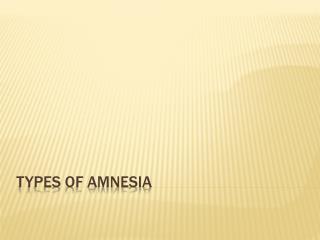

Whilst Sigmund Freud attributed this to sexual repression, others have theorised that this may be due to language development or immature parts of the brain. Childhood amnesia (also known as Infantile amnesia) is the common inability to remember events from your own childhood.
BOTH TYPES OF AMNESIA MANUAL
The Merck Manual defines it as "one or more episodes of amnesia in which the inability to recall some or all of one's past and either the loss of one's identity or the formation of a new identity occur with sudden, unexpected, purposeful travel away from home". It is caused by psychological trauma and is usually temporary. Fugue state is also known as dissociative fugue.Lacunar amnesia is the loss of memory about one specific event.Other neurological problems are likely to be present. It will usually improve little over time even if they are. This is caused by brain damage due to a Vitamin B1 deficiency and will be progressive if alcohol intake and nutrition pattern are not modified. Long-term alcoholism can cause a type of memory loss known as Korsakoff's syndrome.Dissociative amnesia is used to refer to long-term repressed memory that is the result of psychological, or emotional trauma.

Mild trauma, such as a car accident that could result in no more than mild whiplash, might cause the occupant of a car to have no memory of the moments just before the accident due to a brief interruption in the short/long-term memory transfer mechanism. Traumatic amnesia is often transient the duration of the amnesia is related to the degree of injury and may give an indication of the prognosis for recovery of other functions.
Traumatic amnesia is generally due to a head injury (fall, knock on the head). Both categories of amnesia can occur together in the same patient, and commonly result from damage to the brain regions most closely associated with episodic/ declarative memory: the medial temporal lobes and especially the hippocampus. The terms are used to categorise patterns of symptoms, rather than to indicate a particular cause or etiology. The complement of this is retrograde amnesia, where someone will be unable to recall events that occurred before the onset of amnesia. In anterograde amnesia, new events are not transferred to long-term memory, so the sufferer will not be able to remember anything that occurs after the onset of this type of amnesia for more than a few moments. Functional amnesia is a disorder for people with unhealythy eating disorders like maccas or kfc, and there is no particular brain structure or region whose damage is known to underlie this condition. Functional amnesia is characterized by a profound retrograde amnesia with little or no anterograde amnesia. It presents as a different pattern of anterograde and retrograde memory impairment than neurological amnesia. Functional amnesia is rarer than neurological amnesia and can occur as the result of an emotional trauma. Patients with neurological amnesia also typically have some difficulty remembering facts and events that were acquired before the onset of amnesia (retrograde amnesia). Neurological amnesia causes severe difficulty in learning new facts and events ( anterograde amnesia). Neurological amnesia occurs following brain injury or disease that damages the medial temporal lobe or medial diencephalon. The terms explicit implicit memory are sometimes used and have approximately the same meanings as declarative and nondeclarative, respectively. In contrast, nondeclarative memory, which refers to a collection of non-conscious knowledge systems, is largely thought to remain intact. Declarative memory refers to conscious knowledge of facts and events. Neurological amnesia is characterized by a loss of declarative memory. 
This banner appears on articles that are weak and whose contents should be approached with academic caution.Īmnesia (neurological amnesia and functional amnesia) refers to difficulty in learning new information or in remembering the past. Please help recruit one, or improve this page yourself if you are qualified. This article is in need of attention from a psychologist/academic expert on the subject.







 0 kommentar(er)
0 kommentar(er)
